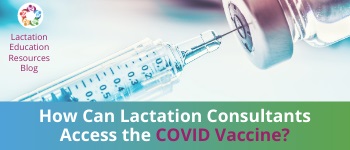How Can Lactation Consultants Access the COVID Vaccine?


As the COVID vaccine is rolled out across the United States, many lactation consultants employed in hospitals, clinics, health departments, and other settings are already being offered the opportunity to be vaccinated through their employers. However, private practice lactation consultants who are self-employed are now wondering when they might have the opportunity to become vaccinated.
This post will be reviewing the vaccine rollout process and how it applies to private practice lactation consultants; it is limited in scope to the United States, as each country is developing their own vaccination plans. Below, we answer some common questions:
How is the vaccine being rolled out in the United States?
As the U.S. does not have a centralized national healthcare system, rollout is largely being left to the states. The Centers for Disease Control has provided guidelines for vaccine prioritization which states are encouraged, but not required, to follow. The guidelines recommend vaccine administration be prioritized in the following phases:
-
-
a) Healthcare personnel and residents of long-term care facilities
- b) Persons aged ≥75 years and frontline essential workers (non-healthcare workers)
- c) Persons aged 65-75 years, persons aged 16-64 years with high-risk medical conditions, and essential workers not recommended for vaccination in phase 1b.
- All other persons aged ≥16 years not already recommended for vaccination in prior phases. (Trials are ongoing in children and adolescents, but no COVID vaccines are currently approved for use <16 years of age.)
Are lactation consultants considered healthcare personnel in Phase 1a?
The CDC’s definition of healthcare personnel states that the term “refers to all paid and unpaid persons serving in healthcare settings who have the potential for direct or indirect exposure to patients or infectious materials, including body substances (e.g., blood, tissue, and specific body fluids); contaminated medical supplies, devices, and equipment; contaminated environmental surfaces; or contaminated air. These HCP may include, but are not limited to, emergency medical service personnel, nurses, nursing assistants, physicians, technicians, therapists, phlebotomists, pharmacists, students and trainees… and persons (e.g., clerical, dietary, environmental services, laundry, security, maintenance, engineering and facilities management, administrative, billing, and volunteer personnel) not directly involved in patient care but potentially exposed to infectious agents that can be transmitted among from HCP and patients.”
Lactation consultants provide healthcare to patients, with a level of direct exposure to patients equal to or higher than many of the personnel listed. While the list does not explicitly include lactation consultants, it names a number of similar professions and states that it is not limited to only the roles named.
While we feel confident that lactation consultants are healthcare personnel for the purposes of Phase 1a, you will want to clarify your individual area’s definition; see more information on that below.
How can private practice lactation consultants find out about and sign up for vaccination opportunities?
As we mentioned above, each state is coordinating their own vaccine rollout. Each state is handling the process somewhat differently.
Ultimately much of the direct vaccination provision appears to be managed by county health departments, hospitals, and regional health systems. The teams coordinating vaccine delivery in these organizations may lack information on local independent healthcare providers. So we recommend the following steps:
- Contact your local municipality’s public health department. Understand that health departments in particular are under a tremendous amount of stress and staff demands at this time, so it may be difficult to reach someone promptly. Reaching out to your local maternal and child health division, in addition to general COVID and vaccination teams, may be helpful. Make them aware that you are interested in vaccination, and ask what the process is for independent healthcare providers to access the vaccine in your area. Request to be added to any contact lists they are using to reach out to local medical practices about vaccine availability.
- Reach out to any contacts in local hospitals. Ask about vaccine doses they may have available for non-employee healthcare workers. Also ask if they are coordinating any community healthcare worker vaccination clinics and the eligibility criteria for those clinics. Similar to the health department, request to be included in any communications they send out to local medical practices.
- If you have local, regional, or state breastfeeding coalitions, work with your coalition to reach out to your local city, county, other municipality, and/or state health departments as a group. This may increase your chances of receiving a response, and will help bring more lactation consultants into a single unified communication process. Consider collecting data from lactation consultants in your group on the total number of monthly patient contacts to help illustrate the collective impact of lactation consultant vaccination.
How can private practice lactation consultants advocate to receive the vaccine?
Your local public health agencies may not be familiar with the type of work that you do, potentially assuming that it can be completely virtual or that your patient contact is limited. The following may be helpful talking points in advocating for lactation consultant inclusion:
- Lactation consultants provide direct patient care; the nature of the support we provide often involves very close face-to-face patient contact as we assist with latch and positioning. This care cannot always be provided virtually, and cannot be delayed when there are urgent feeding issues in a young baby. As mentioned above, consider documenting the number of monthly patient contacts to illustrate the amount of face-to-face care being provided.
- Lactation consultants care for a particularly vulnerable population (newborns and newly postpartum people). Vaccination protects not only the lactation consultant, but may protect their patients as well.
- Hospitals are generally vaccinating all postpartum staff, including lactation consultants, in high priority tiers.
- Review other roles that are currently being offered vaccination (e.g. physical and occupational therapists, home health nurses). If vaccinations are being provided for occupations with similar levels of patient contact as an lactation consultant, explain the parallels between those roles and the lactation consultant’s role.
- Focus on shared goals: to protect as many vulnerable individuals from COVID as possible, as quickly as possible, while bringing down community transmission rates. If vaccinating you and other private practice lactation consultants in your area will serve those goals, you and your local public health agencies should be able to work together.
It has been a difficult past year for many people, including many of those who have struggled to continue to provide the best possible lactation care under the circumstances. The COVID-19 vaccine is bringing hope around the world for a brighter future, including for new families and the people who serve them. We hope this post has helped you understand some strategies for navigating vaccine access as we look ahead to a changed world. Please feel free to use the material here in developing a statement and/strategy in your community.
Related Posts
By accepting you will be accessing a service provided by a third-party external to https://www.lactationtraining.com/
